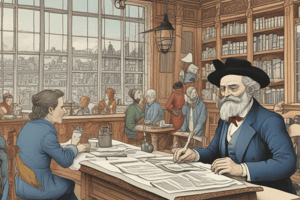Podcast
Questions and Answers
Which of the following is NOT a characteristic of capitalism as described in the text?
Which of the following is NOT a characteristic of capitalism as described in the text?
- Private ownership of industry
- Unequal economic classes
- Freedom of competition
- Government control of the economy (correct)
What is the 'invisible hand' concept, as described in the text, intended to support?
What is the 'invisible hand' concept, as described in the text, intended to support?
- The idea that government should directly manage the economy
- The idea that free markets naturally lead to economic efficiency (correct)
- The idea that communism will eventually eliminate class struggle
- The idea that socialism is the best way to achieve economic equality
Why was capitalism seen as unfair in the 19th century, according to the text?
Why was capitalism seen as unfair in the 19th century, according to the text?
- It led to a system of slavery and oppression
- It resulted in a concentration of wealth that led to extreme inequality (correct)
- It was dominated by powerful monopolies that stifled competition
- It prevented technological progress and innovation
What is the role of the government under socialism, as described in the text?
What is the role of the government under socialism, as described in the text?
According to Marx, what would happen in a socialist society?
According to Marx, what would happen in a socialist society?
What is the role of the government in a communist society, as described in the text?
What is the role of the government in a communist society, as described in the text?
The text describes a communist society as aimed at creating:
The text describes a communist society as aimed at creating:
What does the text suggest was a key characteristic of the Russian Revolution?
What does the text suggest was a key characteristic of the Russian Revolution?
What is the main idea of the third paragraph about Lenin's New Economic Policy (NEP)?
What is the main idea of the third paragraph about Lenin's New Economic Policy (NEP)?
What can be inferred about the impact of World War I on the Russian Revolution?
What can be inferred about the impact of World War I on the Russian Revolution?
The text highlights the use of the Cheka by the Bolsheviks. What does the text suggest about the Cheka’s role in the Russian Revolution?
The text highlights the use of the Cheka by the Bolsheviks. What does the text suggest about the Cheka’s role in the Russian Revolution?
What is the main idea of the second paragraph about the contributions of Vladimir Lenin to the Russian Revolution?
What is the main idea of the second paragraph about the contributions of Vladimir Lenin to the Russian Revolution?
What was a major problem faced by Russian troops on the eastern front of World War I?
What was a major problem faced by Russian troops on the eastern front of World War I?
Which of these options is NOT mentioned in the text as a factor that might have contributed to the Russian Revolution?
Which of these options is NOT mentioned in the text as a factor that might have contributed to the Russian Revolution?
What was the primary purpose of the Bolshevik secret police known as the Cheka?
What was the primary purpose of the Bolshevik secret police known as the Cheka?
What does the text suggest as a contributing factor to the discontent among the Russian workers?
What does the text suggest as a contributing factor to the discontent among the Russian workers?
Flashcards
Capitalism
Capitalism
A system where private individuals or businesses own most of the means of production and compete freely in the market.
Invisible Hand
Invisible Hand
The idea that individual self-interest, guided by market forces, can benefit society as a whole.
Socialism
Socialism
A system where the government controls and manages nearly all aspects of the economy.
Communism
Communism
Signup and view all the flashcards
Classless Society
Classless Society
Signup and view all the flashcards
Unequal Economic Classes
Unequal Economic Classes
Signup and view all the flashcards
Marx's Vision
Marx's Vision
Signup and view all the flashcards
Limited Government Role
Limited Government Role
Signup and view all the flashcards
What triggered the Russian Revolution?
What triggered the Russian Revolution?
Signup and view all the flashcards
What was Lenin's role in the revolution?
What was Lenin's role in the revolution?
Signup and view all the flashcards
How did the Bolsheviks maintain control?
How did the Bolsheviks maintain control?
Signup and view all the flashcards
What was Lenin's economic strategy?
What was Lenin's economic strategy?
Signup and view all the flashcards
Would the Russian Revolution have happened without WWI?
Would the Russian Revolution have happened without WWI?
Signup and view all the flashcards
What were the main causes leading to the Russian Revolution?
What were the main causes leading to the Russian Revolution?
Signup and view all the flashcards
What was a major problem for Russian troops in WWI?
What was a major problem for Russian troops in WWI?
Signup and view all the flashcards
What was the February Revolution?
What was the February Revolution?
Signup and view all the flashcards
Study Notes
Capitalism
- Definition: Private ownership of industry, freedom of competition, resulting in unequal economic classes.
- Government Role: Minimal role; the "invisible hand" (market forces) regulates itself.
- 19th Century Issues: Capitalism was seen as unfair due to extreme wealth disparity.
- Socialism: Government controls almost all aspects of the economy.
- Marx's Theory: Means of production owned collectively by the people, leading to a classless society. Elimination of class struggle.
- Communism: Government controls the entire economy, directly managing the distribution of goods and services. Goal: a completely classless society.
Russian Revolution
- Causes: Actions of Tsar Nicholas II and his wife eroded public trust, leading to a power vacuum. World War I put extreme strain on the Russian government (economic hardship, military losses, public unrest). This contributed to the overthrowing of the monarchy.
- Marxist Ideas: Lenin adapted Marxist ideas (proletariat revolution, necessity of a party to lead revolution) to Russian society. He believed a revolution by the working class was necessary.
- Role of WWI: WWI greatly impacted the Russian revolution by creating significant strain and hardship on the existing government. Economic challenges, losses, and public unrest contributed to the revolution.
- Lenin and Trotsky: They used brutal tactics like terror and execution of suspected counter revolutionaries. This strategy contributed to their success in the Russian Civil War.
- New Economic Policy (NEP): Lenin incorporated some market-based elements (small industries, retail trade, and most agricultural lands) into his economic policy to some degree. This allowed for some level of market activity while controlling major industries.
- Revolution without WWI: Even without WWI, internal issues like political repression and social inequality would likely have prompted a revolution.
Factors Contributing to the Bolshevik Revolution
- Weakness of Tsar Nicholas II: Loss of public trust.
- Discontent of Peasants and Workers: Poor living and working conditions.
- Scandal and Corruption: The affair surrounding Rasputin.
- Failures in WWI: Economic repercussions, loss of life, and inability to manage the war effectively.
- Failure of the Duma: Ineffective legislative body.
- Opposition from Communists: Support for revolution from various opposition groups.
- February Revolution (1917): This was a contributing factor that led to the eventual Bolshevik Revolution.
Studying That Suits You
Use AI to generate personalized quizzes and flashcards to suit your learning preferences.




